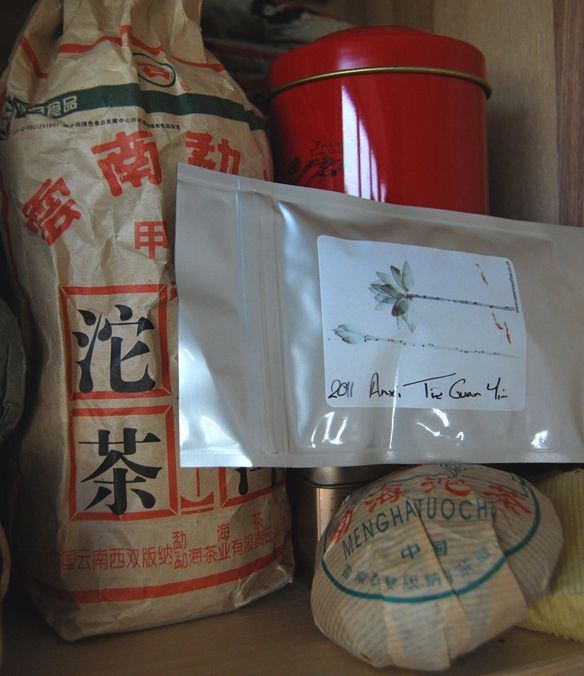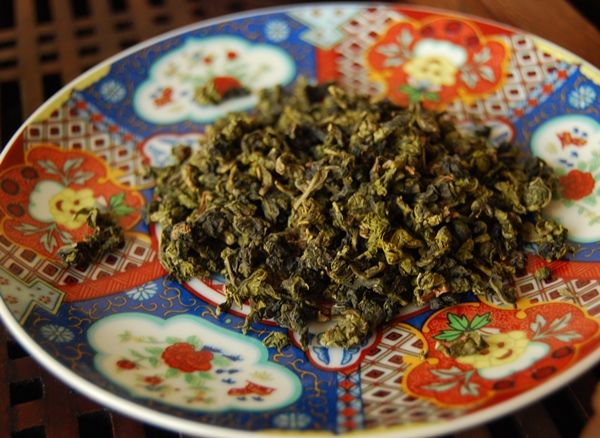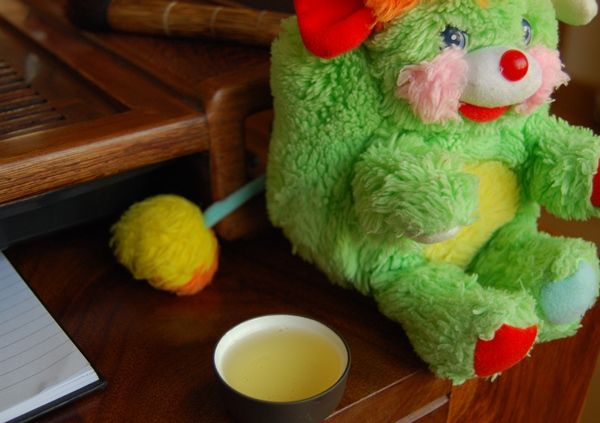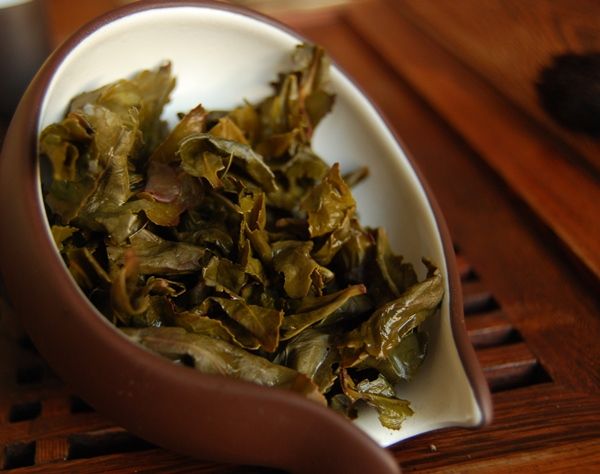I don't drink tieguanyin.
It's not that I don't like it - it's just that I think it's a drink for girls, or fascinating girl-man hybrids. It is, for want of a better adjective, namby pamby.
Imagine my delight when the ever-generous proprietor of Essence of Tea kindly provided us with the sample shown above, which is, if their track record is anything to go by, likely to be very decent. Given Mr. and Mrs. Essence's firm, unshakeable grasp of all things delicate and fine in tea (possibly at odds with my own quest for rough, violent, potent pu'ercha), I anticipate that this will be a charming, refined wulong.
I am not disappointed.
As I reveal the pretty contents of the sample packet, I can feel my testosterone levels steadily decreasing. The leaves are beautiful, rolled examples of the genre.
Perhaps it will not surprise you to learn that it has a clean, green, buttery scent - it rather reminds me of the honeysuckle that my German neighbours (who are both materials scientists, by coincidence) are growing over our fence, in a most pleasant and welcome contravention of neighbour-neighbour boundary lines.
It is at this stage that I will not make a joke about the stereotypical German race. Some of my best friends are German. Some of my teachums are German. I'm pretty sure that somewhere in the dim genetic mists of my family tree, there are some German branches. Therefore, I will simply leave this paragraph dangling in the air, and allow you, dearest Reader, to fill in the gap using your imagination.
Much like the Germans' honeysuckle, this tieguanyin reminds me of summer. It is soapy, floral, and buttery in a gentle way. I wonder if it is perhaps a little too gentle for my tastes, but I am not a delicate soul.
While I feel the oestrogen building up within my body, I take time to reflect on the careful provenance of this most ethereal of tieguanyin. It is from Xiping [shee-ping], which is an Anxi [an-shee] town famous for (allegedly) being the birthplace of tieguanyin. This is not to be confused with the (perhaps marginally more famous to non-tea drinkers) town of Xiping next to my wife's hometown in the historical central part of China, which is famous for various Warring States and Tang Dynasty sites.
Mr. Essence writes that this tea comes from a mountain that goes by the stupefyingly descriptive name of "Laochashan" [old tea mountain], near Yaoyang Village, in the Xiping locale. He also notes that he has tried very hard to find a truly organic version of tieguanyin from this area.
For the last few days, Xiaohu has been sitting on his father's lap, taking the last few sips from each infusion directly out of the pinmingbei [drinking cup]. He has enjoyed several pu'ercha, and genuinely seems to like drinking both new and older shengpu.
My concerns regarding my son's masculinity are eased, as it is with some satisfaction that I observe Xiaohu refusing to drink any more of this tieguanyin after the first few sips.
So there you have it. This is a delicious tea, and while it may or may not cause you to experience some gender-related issues after consumption, my little son gives it the "thumbs down". In fact, he seemed more content to suck on the handle of the tea-brush, and that probably tastes like damp bamboo.
Thanks again to Mr. Essence for the genuinely delightful sample. If you one of those types of people that enjoys tieguanyin, you probably owe it to yourself to have a quick go with a decent organic example such as this from Xiping.
(Currently £34/100g, which reaffirms my conviction that wulong prices can tend to be a touch higher per unit enjoyment than I am comfortable paying - a conclusion that seems to hold across most vendors. At least for the money, in this case, you are getting a very pretty tea with assured provenance.)





Man, you know what they say about mad dogs and Englishmen...
ReplyDelete--shah8
Da Yu Ling? Good, TGY? Bleh...
I have tried this tea twice now, and I like it both times. It is pure, refreshing, not at all overly-vegetal, and all-around pretty darn good. However, to my taste, it doesn't have too much of the Yin Yun characteristic that I look for in high end TGY. For me, the aftertase of this tea lacked the strong TGY Yin Yun profile: it tasted a lot like good oolong tea in general, but not so much like what I have come to expect of top-end TGY. It is smooth and balanced, but not quite in the smooth and balanced way of the best TGY.
ReplyDeleteBen
"Man, you know what they say about mad dogs and Englishmen..."
ReplyDeleteWe urinate on the furniture?
Dear Ben,
Thanks for the notes; it's interesting to read your opinion. I found it a bit lighter than I would otherwise have expected, but I imagine that apologists would probably say that we're more attuned to heretical modern wulong than the traditional variety. That may be true. :)
Toodlepip,
Hobbes
I think I appreciated that there's some actual oxidation in this TGY; what surprised me a little is that given this higher than what is today typical level of oxidation, that the tea soup wasn't more thick and buttery. I also would have expected more of a lingering aftertaste and stimulation of the sides of my throat. Still a very good TGY, much better than the atomic pellets usually available on the market, etc.
ReplyDeleteBen
Agreed, Ben, on all counts.
ReplyDeleteIf you don't like Tie Guan Yin than you probably won't bother.. I have tried Yunnansourcings AAA Grade 2011 Spring Anxi Tie Guan Yin and although I also prefer the stronger earthier and more robust Pu'Erhs I have to admit I was pretty impressed. But I found it to be too floral for my tastes but nonetheless very excellant. I am becoming more and more a fan of Scott Wilson over at YunnanSourcing. His Pu'Erhs are the best I have been able to get my hands on so far.
ReplyDeleteI do prefer Pu'Erhs but I am taking a current tangent on oolongs and gravitating to the Fenghuang's.. more earthy and less floral.
I do enjoy your posts though. I wish I had more resources to devote to various tea tastings myself.
Dear James,
ReplyDeleteThanks for the kind words - my only problem with (green) tieguanyin, in fact, is that one feels pressurised into drinking them before they expire! I have the same problem with lucha. Pu'ercha and hongcha are much more forgiving to the drinker who can't drink everything quickly. :)
Toodlepip,
Hobbes
P.s. If by Fenghuang you mean the dancong teas of Guangdong, aren't they made to be extremely fruity? Many taste like jam! :)
Just so your global readership is not left with the impression that all Tieguanyin tea are of the green version reviewed here. There are high roasted
ReplyDeleteversions
that provide
a completely tea experience (flavour, qi, etc,...)
"My concerns regarding my son's masculinity are eased, as it is with some satisfaction that I observe Xiaohu refusing to drink any more of this tieguanyin after the first few sips."
Gender being a social construct, he may still surprise down the road ;)! Just kidding. Best of luck in your parenting adventures =D!
Best,
TGY
I'll be keeping a close eye on his tea preference ;)
ReplyDelete